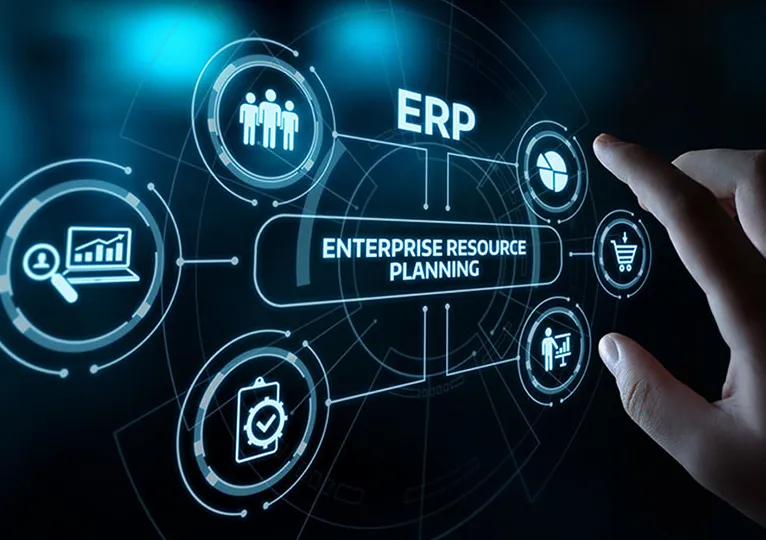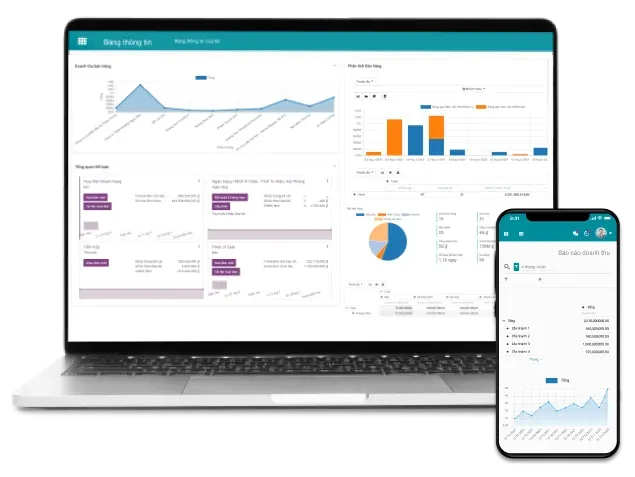Recently, more and more businesses are interested in applying its Viindoo ERP in business management. So what is ERP? Why does the ERP system attract such special attention? Let's go together with Viindoo to learn about the ERP management system and its outstanding strengths.
What is ERP system?
ERP system (Enterprise Resource Planning - Enterprise resource planning) refer to the entire ERP system, including the ERP software, technological infrastructure (such as servers, databases, user interface, etc), and business processes that a company uses to manage its daily operations. "ERP system" encompasses both the software and other supporting components, forming a complete system that enables the business to operate efficiently.
ERP system = ERP Software + Technological Infrastructure + Business Processes

Using ERP for businesses helps increase transparency and improve work efficiency
ERP Software
ERP software is the core of the system, designed to integrate and automate key business functions like Accounting & Finance management, Inventory management, Sales management, and Human Resource management, etc. It provides a centralized platform that helps streamline operations, reduce manual tasks, and improve decision-making through real-time data access.

The ERP business management system includes many different modules
>>> Learn more: What is ERP software? Why your business need an ERP software?
Business Processes
A business process is a set of operational rules that coordinates actions between superiors and subordinates, peers, and different departments. In an ERP system, business processes becomes rules that is configured and executed on ERP software, accurately simulating the real activities of the business while reducing manual tasks to lighten the workload for employees.
>>>>> Learn more: Business Process: What, Why and How to build?
ERP Technological Infrastructure
Technology infrastructure is the collection of technical components that enable the ERP system to operate efficiently. To make this easier to understand, imagine the ERP system as a car serving a business. For the car to run smoothly, we need various technology infrastructure elements, each comparable to essential parts of the car. None of these components can be missing for the car, or the ERP system, to function effectively.
ERP systems are divided into 3 types, including: Cloud ERP (cloud computing ERP), On-premise ERP (on-premise ERP) and Hybrid ERP (combined ERP). Below is a comparison table between ERP types:
Criteria | Cloud ERP (cloud computing ERP) | On-premise ERP (on-premise ERP) | Hybrid ERP (combined ERP) |
Infrastructure | Servers and software are hosted in the cloud | Servers and software are installed at the enterprise | Combines both cloud and on-premises servers |
Accessibility | Access from anywhere with internet | Access only from within the local network or via VPN | Access from both internet and intranet |
Initial investment costs | Low (paid subscription model) | High (requires investment in hardware and software) | Average (combination of subscription costs and internal infrastructure investment) |
Operation and maintenance costs | Low (vendor management and maintenance) | High (self-managed and maintained enterprise) | Medium (depends on cloud or on-premises deployment) |
Customizability | Restrictions (vendor dictates customizations) | High (full customization according to business needs) | Medium (easy customization on on-premises, limited on cloud) |
Suitable for businesses | Small and medium-sized enterprises and businesses want to save initial investment costs | Large businesses or with high security requirements and complex customization capabilities | Businesses have diverse needs and want to combine the advantages of both models |
How to choose the right ERP management system?
Choosing the appropriate ERP business management system is an important decision, directly affecting the performance and development of the organization. Below are factors to consider when choosing ERP:
- Business needs: Businesses need to clearly define their needs and goals. It is necessary to analyze current business processes, identify weaknesses and find out the specific functions that the ERP system needs to meet the needs.
- Scalability: The ERP system should be scalable to accommodate future business growth. Businesses need to consider whether the system can easily add new modules or scale without difficulty.
- Flexibility and customization: The ERP system needs to be flexible so that it can be customized according to the specific requirements of the business. Businesses should test the software's customization capabilities to ensure that it can be adapted to its unique business processes and requirements.
- Expense: Costs include not only initial investment costs but also maintenance, upgrading and employee training costs. Businesses should evaluate whether the system provides value for the cost.
- Security and compliance: Data security is an important factor in choosing an ERP system. Businesses need to ensure that systems have strong security measures in place and comply with legal regulations related to data protection.
- Customer service and support: Evaluating the quality of the supplier's support service is necessary. Businesses should learn about technical support, training and maintenance services to ensure they can receive timely support when needed.
- Integrate with the current system: The ERP system needs to be able to integrate well with the business's current software and systems. Easy integration helps optimize workflows and minimize business disruption.
>>> Learn more: Top reputable ERP providers

ERP needs to centralize all business data into a single system
How much does it cost to implement an ERP system?
The cost of implementing an ERP system is a question that many businesses are interested in when they want to upgrade their management processes. However, there is no specific number for this answer because the cost will depend on many factors. Below are the main cost components that businesses need to consider:
- Software cost: Includes a one-time fee or recurring license for use ERP software and the cost to customize the software to a business's specific needs.
- Hardware cost: If the ERP system is deployed on an internal server, businesses need to calculate hardware procurement and maintenance costs.
- Implementation costs: Includes consulting, installation and configuration services to suit business processes.
- Training costs: Cost of training employees to use the ERP system effectively.
- Maintenance and support costs: Costs for technical support and system maintenance services after ERP implementation.
- Upgrade cost: Cost of upgrading ERP software when there is a new version or when the business expands its scale.

There are many cost components when applying an ERP system
Viindoo - Comprehensive solution for your business
Viindoo is one ERP solution for small and medium businesses that integrates many modules in the same system, helping to manage and operate all business activities from sales, purchasing, warehouse, production, finance, human resources,... on a unified platform. best. With coming, all data is connected and shared, helping business owners have an overview and make accurate business decisions.

Viindoo helps integrate multiple modules in an ERP system
Optimize business operations with Viindoo
- Increase operational efficiency: Vindoo helps automate business processes, reduce manual errors, optimize workflow, and help businesses operate more efficiently.
- Improved information management: Vindoo provides a centralized information management system, helping businesses access and manage data easily, accurately and effectively.
- Enhance decision-making ability: Vindoo provides detailed reports and data analysis, helping businesses make more accurate and effective decisions.
- Reduce costs: Vindoo helps businesses save costs by optimizing processes, minimizing waste, and improving labor productivity.
- Increase revenue: Vindoo helps businesses increase revenue by improving customer service, enhancing marketing efficiency, and optimizing sales management.
- Adapt to change: Vindoo is a flexible solution that can be easily customized and upgraded to suit the evolving needs of your business.
Discover Viindoo ERP
The All-in-one ERP Software for SMEs. Streamlines operations, enhances efficiency, and boosts productivity for your business.

ERP system is not simply an information management tool, but also a powerful tool for the development and performance of businesses in the future. To choose the appropriate ERP management system, businesses need to deeply understand the operating processes within the company. If you want to learn more about effective ERP management software, get in touch with Viindoo at website or contact hotline 02257309838 immediately. or contact hotline 02257309838 immediately.
>>>> Continue With:
